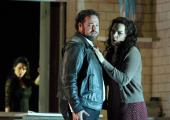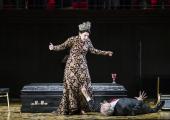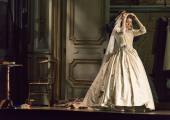It may not have been the best year for eye-popping productions; even visionary director Richard Jones fell a bit short with a tame-ish Royal Opera Bohème, though his non-operatic The Twilight Zone is something else. Instead there's been time to reflect on what makes a true company. While English National Opera, after the end of Mark Wigglesworth's short but unsurpassable tenure, showed what a shortened season looks like – the London Coliseum no longer "the home of ENO", Bat out of Hell taking over from June to August – others continued to blaze a trail forward.
Top prize for showing how far opera can take us into trying to offer consolation in the face of the biggest horror as well as reaching out to commemorate has to go to Opera Holland Park. It lost a loved staff member in the Grenfell Tower fire, hearted the power of vibrant song when the cast of Puccini's La rondine reprised the big ensemble from Act 2 with even bigger emotion (you can watch it on the next page) and put together a starry line-up of volunteer players and singers (chorus included) for a fundraising Verdi Requiem, about which General Director Michael Volpe wrote eloquently for us here. Elizabeth Llewellyn also gets one of the year's star awards for her role as the "Swallow" Magda.
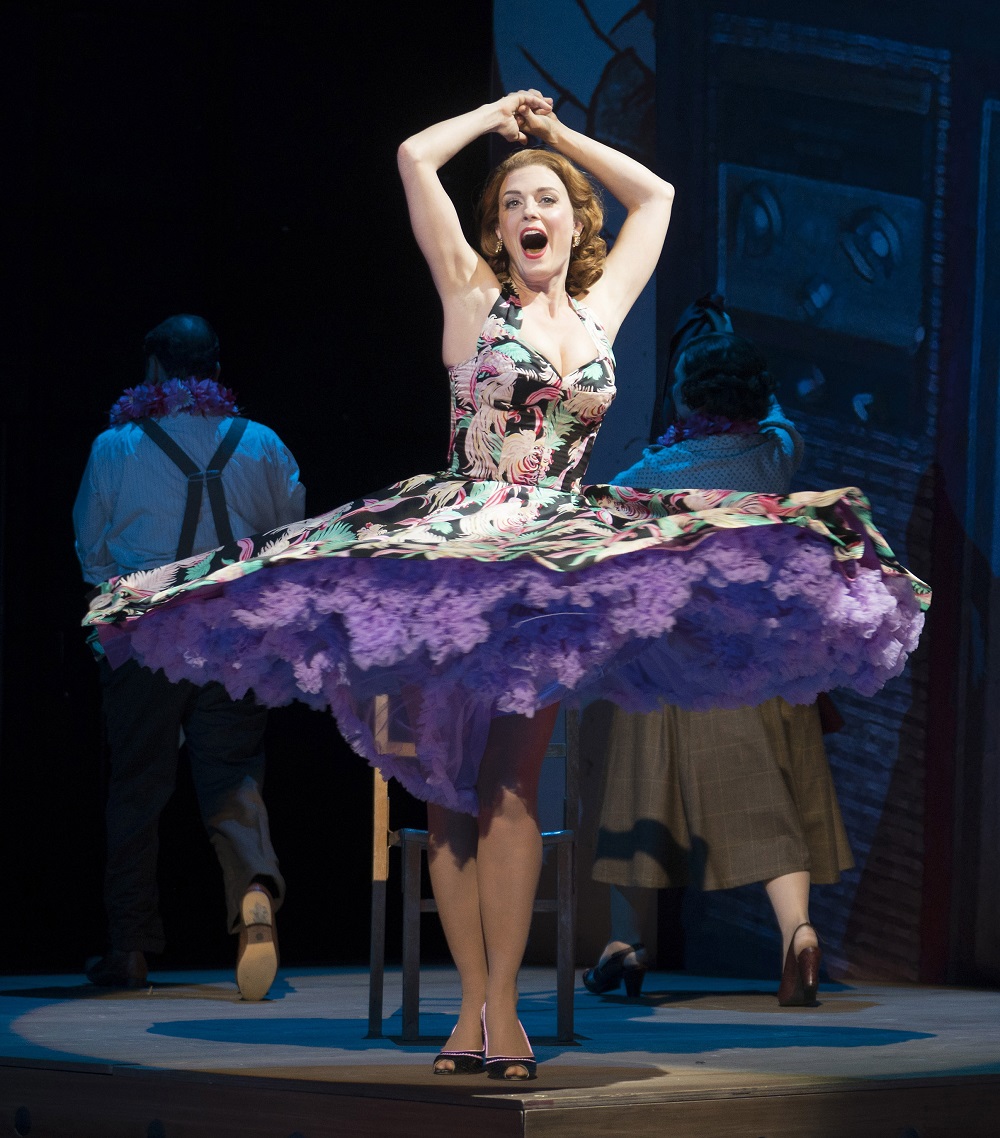 Leeds-based Opera North continues to show how a team works at the highest level, with big works involving the chorus throughout two seasons crowned by its ambition in giving us sheer enchantment with Rimsky-Korsakov's The Snow Maiden, albeit heavily cut. Richard Bratby and Robert Beale shared my enthusiasm for John Fulljames's production, which managed to keep the magic within a clever setting – more than could mostly be said for Dmitri Tcherniakov's more lavish Paris production shortly afterwards, though that boasted a peerless cast led by the bewitching Aida Garifullina. The 2017-18 season in Leeds kicked off with a brilliant series of "Little Greats", with instalments much admired by Robert and by Graham Rickson (if only in part). In the anything-goes mix-and-matching, I saw only Janáček's Osud, disappointing after the revelation ENO once made of it, and Bernstein's Trouble in Tahiti, a five-star achievement with a dazzling performance by mezzo Wallis Giunta (pictured above by Alastair Muir), young singer of the year in my books.
Leeds-based Opera North continues to show how a team works at the highest level, with big works involving the chorus throughout two seasons crowned by its ambition in giving us sheer enchantment with Rimsky-Korsakov's The Snow Maiden, albeit heavily cut. Richard Bratby and Robert Beale shared my enthusiasm for John Fulljames's production, which managed to keep the magic within a clever setting – more than could mostly be said for Dmitri Tcherniakov's more lavish Paris production shortly afterwards, though that boasted a peerless cast led by the bewitching Aida Garifullina. The 2017-18 season in Leeds kicked off with a brilliant series of "Little Greats", with instalments much admired by Robert and by Graham Rickson (if only in part). In the anything-goes mix-and-matching, I saw only Janáček's Osud, disappointing after the revelation ENO once made of it, and Bernstein's Trouble in Tahiti, a five-star achievement with a dazzling performance by mezzo Wallis Giunta (pictured above by Alastair Muir), young singer of the year in my books.
Further north, the BBC Scottish Symphony Orchestra kicked off the year in thoughtful, complex style with Martyn Brabbins conducting a semi-staged performance of what may be Birtwistle's operatic masterpiece, The Last Supper, five-starred by David Kettle. The orchestra's London counterpart celebrated John Adams' 70th birthday by inviting him to conduct another rich and troubling work, Doctor Atomic, which consolidated its hold and Gerald Finley's claim to owning the role of troubled nuclear scientist Robert Oppenheimer. Thomas Adès's The Exterminating Angel also continued to prove its worth, after last year's Salzburg premiere, with the same cast at the Royal Opera; the intriguing Buñuel premise also hooked Peter Quantrill. 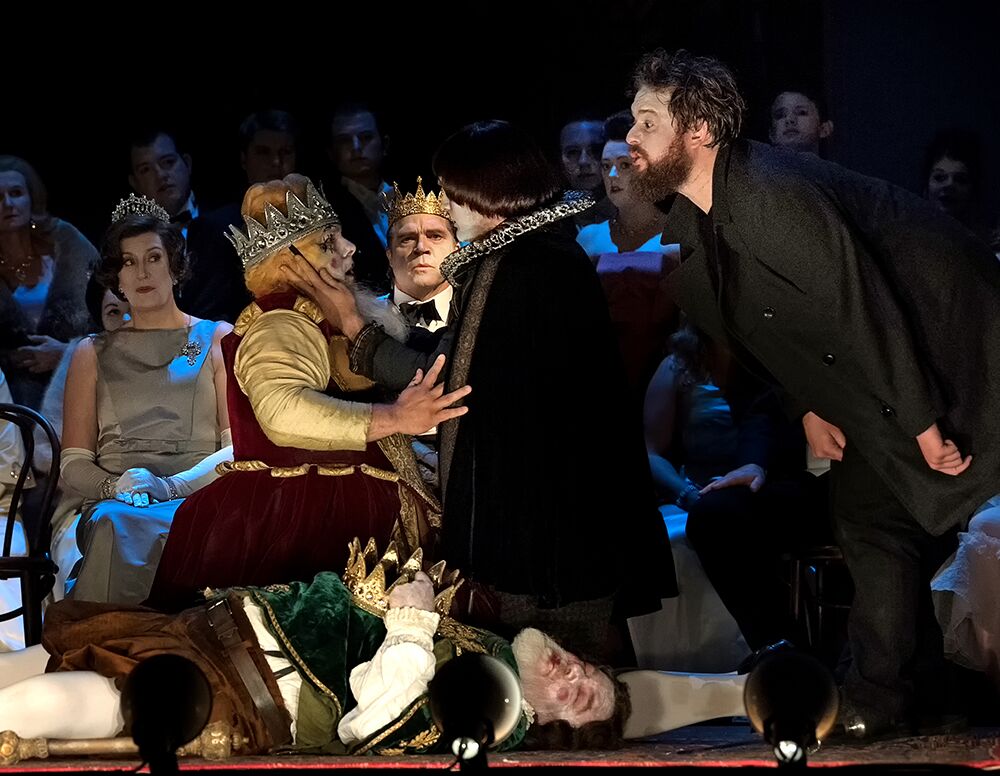 Glyndebourne demonstrated its ability to prepare a new work to the very highest level in a clearly, imaginatively staged and superbly cast world premiere, Brett Dean's Hamlet, chosen by Gavin Dixon as his opera of the year, and though question marks remain for me about the finely-wrought substance, here's proof, alongside the Adams, Adès, Birtwistle and even Ryan Wigglesworth's musically one-dimensional The Winter's Tale at ENO, that UK houses and concert halls can always furnish the finest possible team of singers (among the cast pictured above by Bill Knight for theartsdesk, Sarah Connolly as Gertrude, Rodney Gilfry as Claudius and Allan Clayton as Hamlet)..
Glyndebourne demonstrated its ability to prepare a new work to the very highest level in a clearly, imaginatively staged and superbly cast world premiere, Brett Dean's Hamlet, chosen by Gavin Dixon as his opera of the year, and though question marks remain for me about the finely-wrought substance, here's proof, alongside the Adams, Adès, Birtwistle and even Ryan Wigglesworth's musically one-dimensional The Winter's Tale at ENO, that UK houses and concert halls can always furnish the finest possible team of singers (among the cast pictured above by Bill Knight for theartsdesk, Sarah Connolly as Gertrude, Rodney Gilfry as Claudius and Allan Clayton as Hamlet)..
To the west, Bristol was first off the mark in hosting John Eliot Gardiner's semi-staged Monteverdi trilogy – L'Orfeo, Il ritorno d'Ulisse and L'incoronazione di Poppea all hailed by Stephen Walsh, with Alexandra Coghlan choosing the overall achievement as her operatic best of year. Welsh National Opera goes from strength to strength under David Pountney; Stephen admired several of its revivals as much as its new productions, and singles out Pountney's production of Musorgsky's Khovanshchina for revealing even more to him of the work's genius – and from the author of a very fine book on the composer and his circle, that's fine praise indeed (pictured below by Clive Barda: Miklós Sebestyén as Dosifey, Robert Hayward as Ivan Khovansky and Mark Le Brocq as Prince Golitsyn).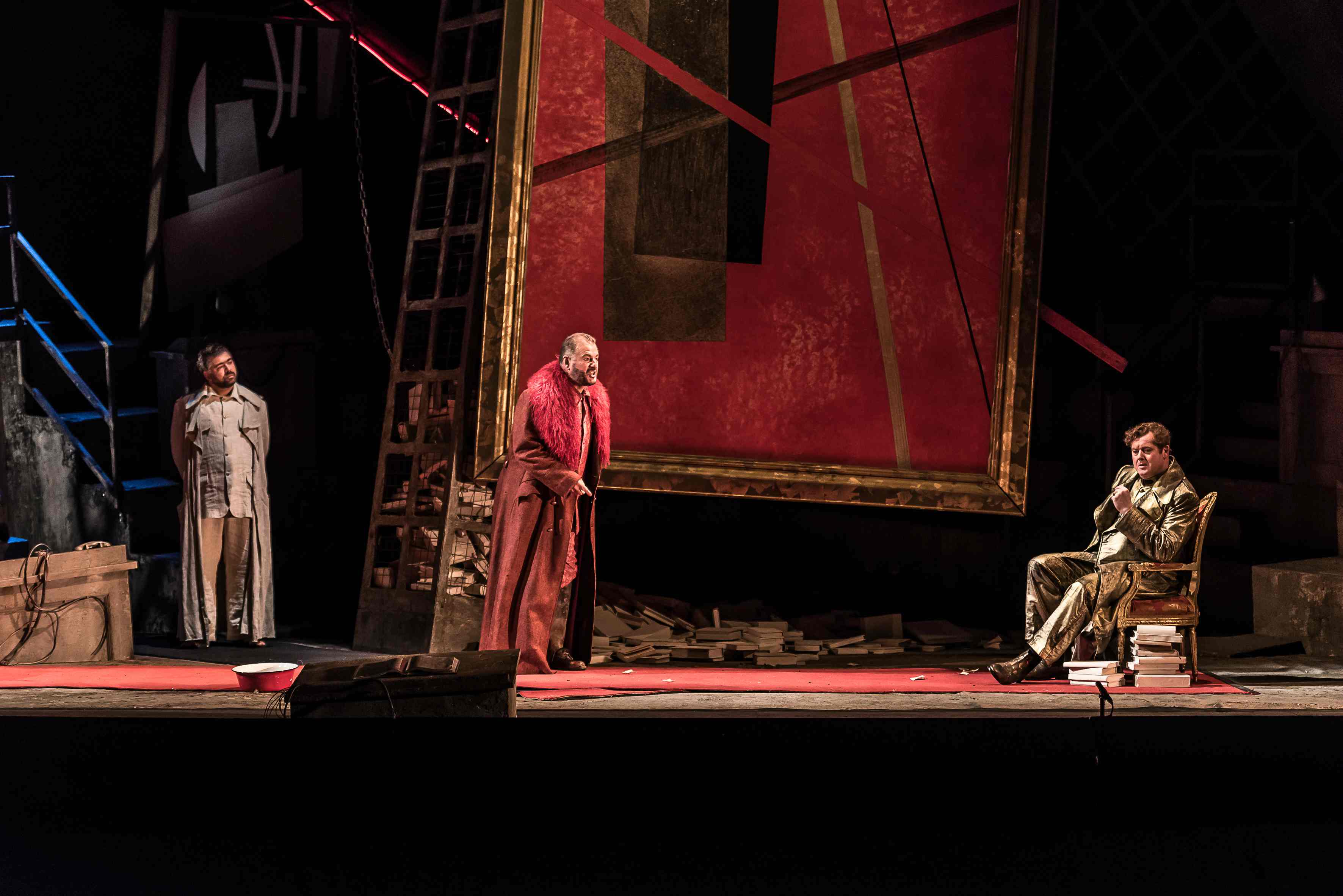 I too was won over to the post-Musorgsky (mostly Shostakovich-orchestrated) whole, perhaps for the very first time, in Semyon Bychkov's magisterial yet always musical-dramatic and flowing account with the BBC Symphony Orchestra at the Proms, again strongly cast with magnificent Old Believers in Elena Maximova's Marfa and Ain Anger's Dosifey and a peerless chorus with the Slovak Philharmonic Choir as backbone. Vladimir Jurowski's phenomenal hard work – for Hamlet, he'd even called an eight-hour rehearsal for the covers the day before the performance – showed in one of the most complex yet bewitching of all operatic scores, Enescu's Oedipe, faring even better in concert than it had at the Royal Opera in 2016: hats off, a genuine neglected masterpiece.
I too was won over to the post-Musorgsky (mostly Shostakovich-orchestrated) whole, perhaps for the very first time, in Semyon Bychkov's magisterial yet always musical-dramatic and flowing account with the BBC Symphony Orchestra at the Proms, again strongly cast with magnificent Old Believers in Elena Maximova's Marfa and Ain Anger's Dosifey and a peerless chorus with the Slovak Philharmonic Choir as backbone. Vladimir Jurowski's phenomenal hard work – for Hamlet, he'd even called an eight-hour rehearsal for the covers the day before the performance – showed in one of the most complex yet bewitching of all operatic scores, Enescu's Oedipe, faring even better in concert than it had at the Royal Opera in 2016: hats off, a genuine neglected masterpiece.
An epic on an even bigger scale was the best Wagner Ring I've seen since Kupfer's at Bayreuth in 1990 – the underrated Ádám Fischer masterminding a minimally staged production, integrated with very original video work, within the world's best concert-hall acoustics, those of Budapest's Müpa concert hall. Iréne Theorin managed a triple whammy of Brünnhildes on three consecutive nights: a living legend. That's the last outing for this 11-year triumph, but more Wagner is on the bill next summer. 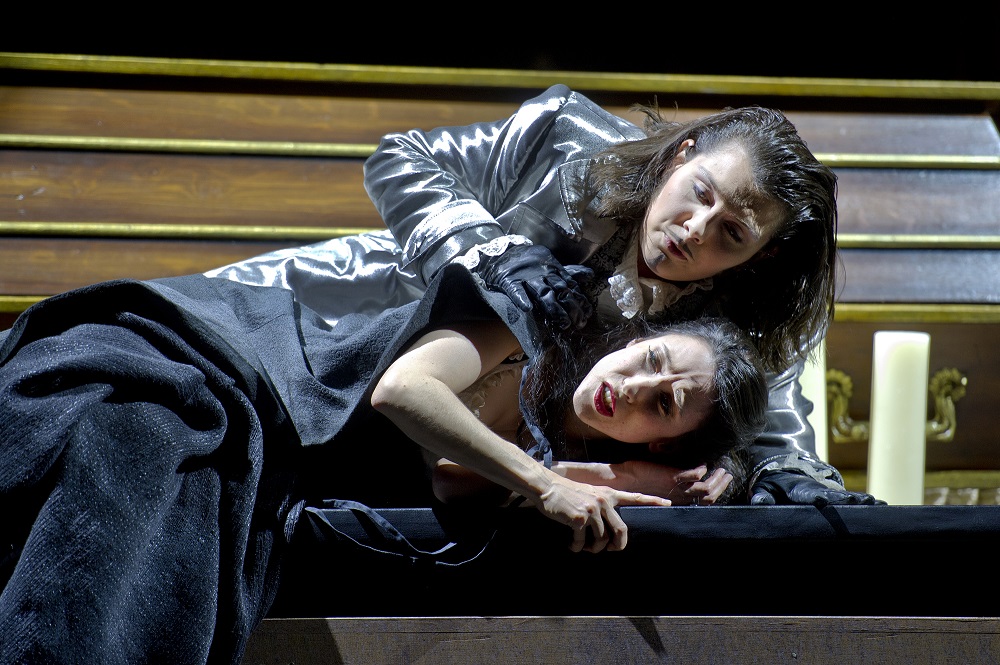 On a lighter ensemble note, ENO's hit of the year was another revival, of Handel's Partenope, which I was seeing for the first time and which included a hugely impressive last-minute stand-in, young company tenor Rupert Charlesworth. Though Handel can have his longueurs with a less than perfect cast, he sparkled here and in the best Göttingen International Handel Festival production I've seen, Carlos Wagner's take on the jewel-laden Lotario with a superb young team led by mezzo Sophie Rennert and soprano Marie Lys (pictured above by Alciro Theodoro da Silva). Their slimmed-down concert staging for children proved just as delightful, a model of how to open up opera to all.
On a lighter ensemble note, ENO's hit of the year was another revival, of Handel's Partenope, which I was seeing for the first time and which included a hugely impressive last-minute stand-in, young company tenor Rupert Charlesworth. Though Handel can have his longueurs with a less than perfect cast, he sparkled here and in the best Göttingen International Handel Festival production I've seen, Carlos Wagner's take on the jewel-laden Lotario with a superb young team led by mezzo Sophie Rennert and soprano Marie Lys (pictured above by Alciro Theodoro da Silva). Their slimmed-down concert staging for children proved just as delightful, a model of how to open up opera to all.
The Royal Opera again struck golden heartbreak with its Madama Butterfly heroine in the still-beautiful Caurier and Leiser production, the dare-all young diva Ermonela Jaho (sadly it also claims turkey of the year in outgoing Artist Director Kasper Holten's messy production of Die Meistersinger von Nürnberg, which is not to return). Operatic partnerships don't get much better than Jaho's partnership with the best Puccini conductor alive, also the Royal Opera's Music Director, Antonio Pappano. 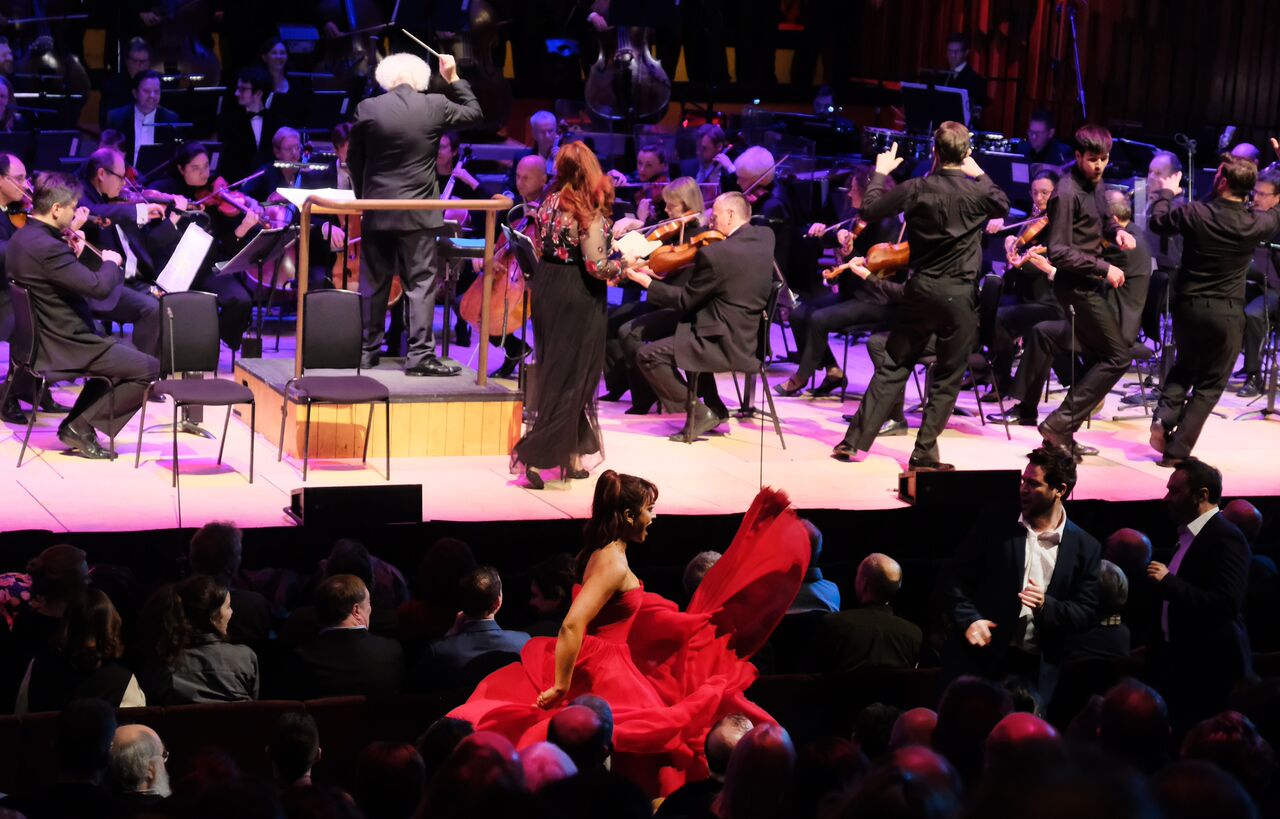 Michael Chance's takeover at what we must now call the Grange Festival near Winchester included a sparkling team in veteran John Copley's laugh-out-loud funny (but never overdone) production of Britten's Albert Herring, with Orla Boylan's Lady Billows imperiously leading the Loxford and District May Day plans. And I'm sorry to have missed the fun of a last choice, timewise too, relished by Gavin Dixon and commended by Jessica Duchen, as Simon Rattle and a fine team had fun with Bernstein's Wonderful Town at the Barbican ("Conga!" pictured above by Mark Allan). We'll be seeing more of Sir Simon in the Classical choice tomorrow.
Michael Chance's takeover at what we must now call the Grange Festival near Winchester included a sparkling team in veteran John Copley's laugh-out-loud funny (but never overdone) production of Britten's Albert Herring, with Orla Boylan's Lady Billows imperiously leading the Loxford and District May Day plans. And I'm sorry to have missed the fun of a last choice, timewise too, relished by Gavin Dixon and commended by Jessica Duchen, as Simon Rattle and a fine team had fun with Bernstein's Wonderful Town at the Barbican ("Conga!" pictured above by Mark Allan). We'll be seeing more of Sir Simon in the Classical choice tomorrow.
Next page: watch the Opera Holland Park encore for the victims of the Grenfell Tower fire


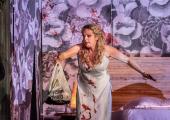
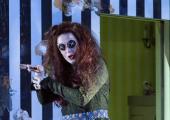
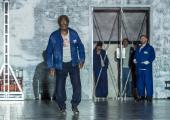
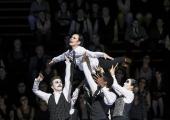
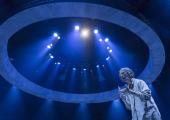
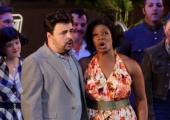
 Leeds-based Opera North continues to show how a team works at the highest level, with big works involving the chorus throughout two seasons crowned by its ambition in giving us sheer enchantment with
Leeds-based Opera North continues to show how a team works at the highest level, with big works involving the chorus throughout two seasons crowned by its ambition in giving us sheer enchantment with Glyndebourne demonstrated its ability to prepare a new work to the very highest level in a clearly, imaginatively staged and superbly cast world premiere,
Glyndebourne demonstrated its ability to prepare a new work to the very highest level in a clearly, imaginatively staged and superbly cast world premiere,  I too was won over to the post-Musorgsky (mostly Shostakovich-orchestrated) whole, perhaps for the very first time, in Semyon Bychkov's magisterial yet always musical-dramatic and flowing account with the BBC Symphony Orchestra
I too was won over to the post-Musorgsky (mostly Shostakovich-orchestrated) whole, perhaps for the very first time, in Semyon Bychkov's magisterial yet always musical-dramatic and flowing account with the BBC Symphony Orchestra  On a lighter ensemble note, ENO's hit of the year was another revival, of
On a lighter ensemble note, ENO's hit of the year was another revival, of  Michael Chance's takeover at what we must now call the Grange Festival near Winchester included a sparkling team in veteran John Copley's laugh-out-loud funny (but never overdone) production of
Michael Chance's takeover at what we must now call the Grange Festival near Winchester included a sparkling team in veteran John Copley's laugh-out-loud funny (but never overdone) production of 